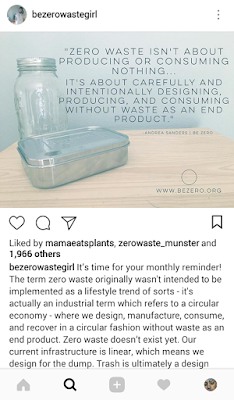Three favourite zero waste account #1
MINDFUL and PEACE
When I stress out about having "the perfect" zero waste lifestyle, when I worry too much about all that is left to achieve, or when the state of the world drawn me, this account is the one that calms me down.
 "It’s time for your monthly reminder!
"It’s time for your monthly reminder!The term zero waste originally wasn't intended to be implemented as a lifestyle trend of sorts - it's actually an industrial term which refers to a circular economy - where we design, manufacture, consume, and recover in a circular fashion without waste as an end product.
Zero waste doesn’t exist yet.
Our current infrastructure is linear, which means we design for the dump. Trash is ultimately a design problem.We tend to take the "zero waste" term as though it's all in or nothing...as though you don't consume or participate in any other thing that could be waste related.
The premise of zero waste is actually to look carefully at what we are designing (to mimic the systems of nature), to embrace careful consumption, material mindfulness, resourcefulness, simplicity, and to revisit craftsmanship of our products and services. It's about bringing value back into our belongings, people, and community. The shift is about changing our attitudes towards waste, consumerism, & resource nutrient flows. We also have to understand that anything we consume right now can be spun with a bad environmental breakdown, that's because we've designed infrastructure, manufacturing, consumption, and disposal with waste and convenience in mind.
By having a low-waste mindset it becomes our living protest against this linear economy of production and consumption. It's saying, I want a better outcome than the tons of trash and toxic plastics polluting our planet.
I want better design, better recovery, long lasting, durable, reusable and repairable products. This level of consumer demand will ripple upstream and that's how change will start to happen. We have a long way to go still.
Remember, not everyone will have the same access or ability to make changes or do something. There are lots of complexities - social, political, economic, environmental issues that are barriers. There is no perfect system right now. Do your best. •"



Commentaires
Enregistrer un commentaire